What Stan Kroenke's imminent power grab means for Arsenal
With Arsenal’s majority shareholder set for total ownership, James McNicholas assesses the outcome for AFC – on the pitch and off it
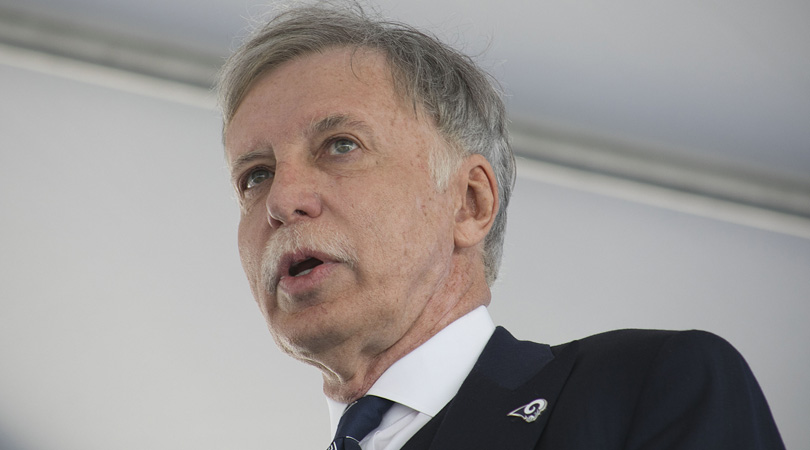
Stan Kroenke is on the verge of forcibly taking complete control of Arsenal. On Tuesday August 7, he announced his intention to buy the remaining 33% of the company, and with Alisher Usmanov apparently willing to sell his 30% stake, the rest is merely a formality. For those Gunners who have opposed the American – even chanting against him at several stages last season – resistance has ultimately proved futile.
Some pockets of Arsenal fans still appear relatively relaxed. There are plenty wondering what all the fuss is about: with 67% to his name already, Kroenke effectively already ran Arsenal anyway. In their minds, he’s merely consolidating a position that has been the status quo for some time.
It’s certainly true that this has been a long time coming. Kroenke first invested in Arsenal back in 2007, acquiring just under 10%. By 2011, he had become the majority shareholder after buying out the stakes owned by Lady Nina Bracewell-Smith and Danny Fiszman. Kroenke’s rival for ownership, Russian billionaire Usmanov (below), held out for as long as it made political sense. However, he has now succumbed and accepted Kroenke’s buyout bid – something he insisted he had no intention of doing due to his love for the club.
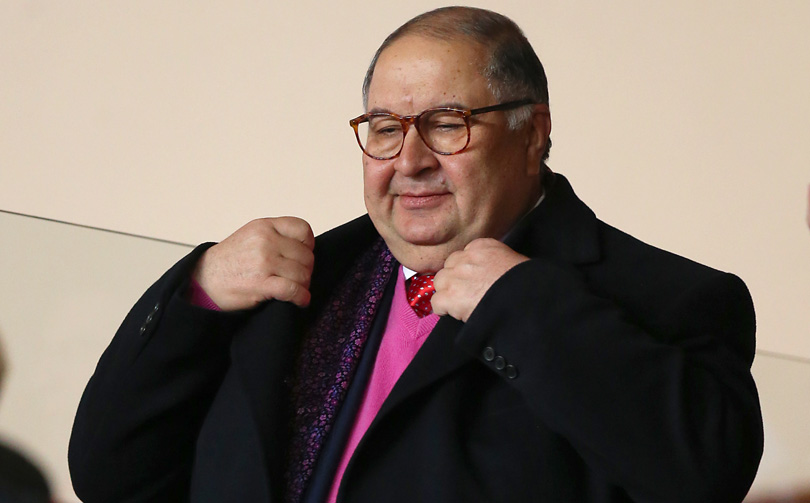
The removal of Usmanov, a man with an unsavoury reputation, is one of the silver linings to this deal for Arsenal fans. From an ethical point of view, Kroenke appears to represent the lesser of two evils.
No public challenge
However, there remain practical concerns about this new ownership model. The main issue here is transparency: while the club will still file financial reports to companies house, its status as a private business will enable Kroenke to act under considerably less scrutiny. He is also likely to do away with the AGM. While those meetings had descended into something approaching pantomime in recent years, they did at least offer an opportunity for shareholding fans to publicly challenge Kroenke.
By way of example, minority shareholders were able to take him to task for two payments of £3m made to KSE (Kroenke Sports Enterprises) for “consultancy services”. In a post-AGM world, Kroenke will not be directly answerable to fans and free to take up a model similar to that of the Glazers at Manchester United (who pay themselves dividends as shareholders).
Get FourFourTwo Newsletter
The best features, fun and footballing quizzes, straight to your inbox every week.
It’s a genuine threat to the financial integrity of the club. In order to buy the remainder of the shares, Kroenke has taken out a £550m loan from Deutsche Bank. It’s entirely possible that Kroenke will leverage the value of Arsenal and its assets to meet payments on that loan – just as the Glazers attempted to do in Manchester. It doesn’t take much imagination to see that this could have significant repercussions on the field.
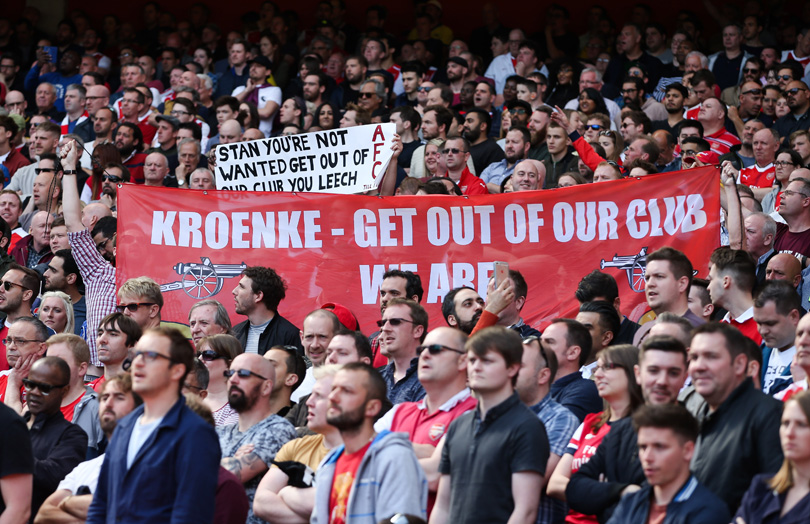
The Arsenal Supporters Trust have deemed the takeover “a very sad day for Arsenal Football Club” – and it’s certainly true that there is an emotional dimension to this development. Plurality of ownership is part of Arsenal’s tradition. Many of the fans whose shares will be subject to a compulsory purchase by Kroenke did not invest for financial reasons, but simply as an expression of their support. Many owned no more than a single share, but that granted them a stake in the club of their heart. Unlike Usmanov, they would never have willingly sold.
The AST had a relatively small combined stake-holding, but it at least gave fans a platform and a voice. Gone now are the days when Arsenal could claim to being run by people with a genuine affection for the club. The likes of David Dein, Danny Fiszman, Ken Friar and Peter Hill-Wood once spoke proudly of being “custodians”. Ultimately, however, the decisions to sell their shares were self-serving. Like Usmanov, they chose to cash in their chips.
Speed of change
The timing of the deal is interesting. While we can assume that Tuesday’s announcement is several months in the making, one wonders if Kroenke sensed that this summer was an ideal time to cement his position. Having overseen the removal of Arsene Wenger in May, his stock is a little higher than it would have been had he awarded the Frenchman another unwelcome contract – as he did just 12 months prior. The speed of change this summer suggests Kroenke was laying the foundations for this move.
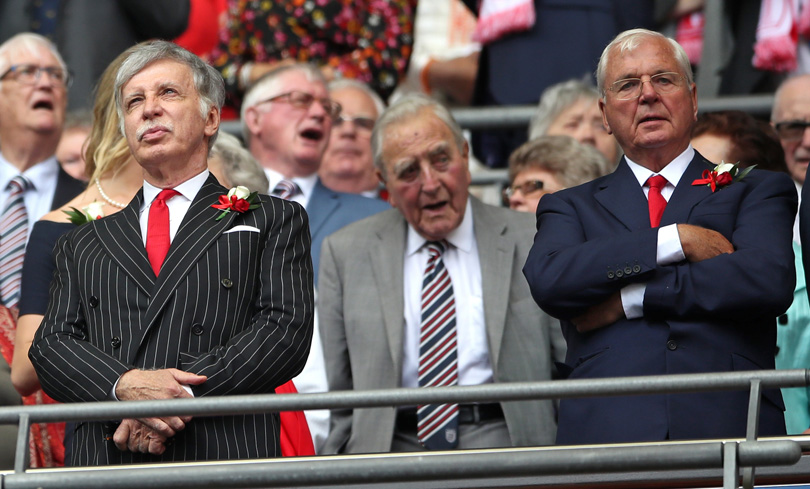
The buyout also puts a new spin on the rumours that chief executive Ivan Gazidis is due to leave the club for Milan. His mooted departure had seemed odd, especially at the time where he had finally wrested control of football matters away from Wenger. Perhaps he saw this coming, prompting his desire to jump ship.
Gazidis is probably acutely aware that the repercussions of his takeover could see another spike in supporter unrest, while Josh Kroenke’s increasing influence on football matters at the club might leave him confined to dealing with the commercial side. Kroenke’s offer document states that he does not intend to change the makeup of the board – but when it comes to Gazidis, he may not have a choice.
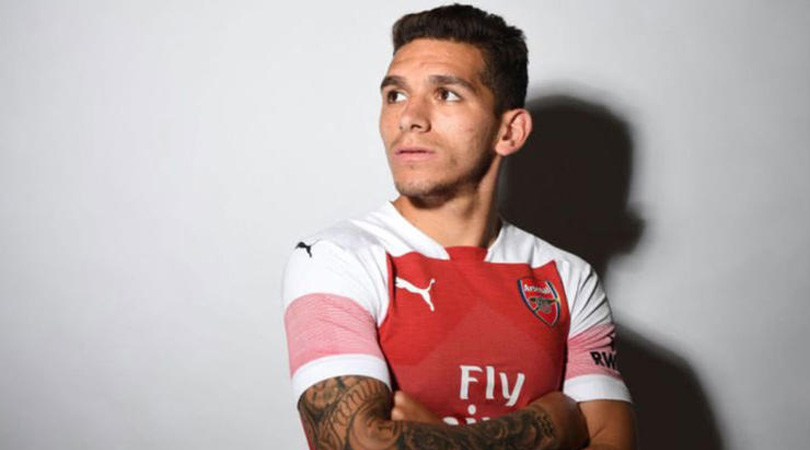
The 10 most exciting Premier League players under the age of 23
Quiz! Can you name Arsenal’s 50 highest Premier League appearance-makers after 1,000 games?
Some Arsenal supporters will greet the takeover news with a shrug. After all, the tug of war between Kroenke and Usmanov had threatened to paralyse Arsenal. Kroenke has suggested that the company going private will enable it to implement business strategies quicker, with less resistance. The American can now accelerate his plans for the club’s future.
However, most fans remain concerned about precisely what those plans might entail. When Wenger was manager, many complained that the club was subject to an autocracy. Now, that is undoubtedly the case – and distressingly, Kroenke would appear to be a far less benevolent dictator than Wenger ever was.
It’s impossible to escape the memory of Wenger’s carefully-chosen words when he announced his decision to step down in April: “To all the Arsenal lovers, take care of the values of the club.”
Perhaps he had a vision of what was to follow. With Kroenke now in sole control, protecting those values may become all the more difficult.
